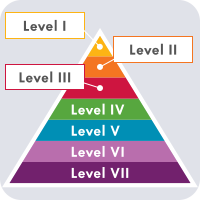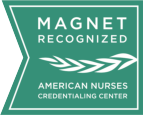Evidence-based practice (EBP) provides the foundation for the evaluation of practice and the commitment to scientific inquiry. The goal is to advance nursing practice individually and collectively.
Evidence-based practice is a problem-solving approach to how healthcare is delivered that integrates the best evidence from high-quality studies with a clinician’s expertise and also a patient’s preferences and values (Melnyk & Fineout-Overholt, 2015). Evidence-based practice is described as a 7-step process:
- Cultivate a spirit of inquiry and EBP culture.
- Ask the PICO(T) question.
- Search for the best evidence.
- Critically appraise the evidence.
- Integrate the evidence with your clinical expertise and patient preferences to make the best clinical decision.
- Evaluate the outcome(s) of the EBP practice change.
- Disseminate the outcome(s).
EBP & Research Council
The Evidence-Based Practice & Research Council is a round-table of the multi-disciplinary team to promote quality and safety in patient care based on best available evidence.
We are committed to a systematic approach to assess current healthcare practices that answers the question “What is best for our patients?” The answer is discovered and supported through the strongest and most appropriate source of evidence available, in addition to incorporating clinical expertise and patient values and preferences. This is a dynamic process with the goal to improve nursing practice and patient outcomes.
EBP & Research Fellowship Program
The Fellowship first launched in January 2011 and is a 1-year program open to all clinical staff to develop their clinical, leadership, problem-solving, and evidence-based practice skills through an intensive mentorship program. Participants are guided through implementation of a new innovation in their department using the evidence-based practice process or through the conduction of an original research study.
Our Fellowship Program sponsors clinical staff to address relevant clinical issues impacting practice and patient or system outcomes through accomplishment of the following goals:
- To learn about the essential steps in the evidence-based practice process or the development of new knowledge through research.
- To enhance the ability to engage in the scholarship of discovery, integration, application, and teaching.
EBP & Research Conference
NorthBay’s Annual Evidence-Based Practice & Research Conference is an opportunity to share new research, evidence based practice implementation and new innovations focused on eliminating preventable harm to patients across the healthcare continuum. Open to all healthcare professionals, our conference grants a seven (7) contact hour CE certificate upon completion.
Learn more about our 2023 Evidence-Based Practice & Research Conference here.

Adapted from © Copyright 2011-2018, Lynn Gallagher-Ford; The Helene Fuld Health Trust National Institute for Evidence-based Practice; Melynk & Fineout-Overholt, Evidence-based practice in nursing and healthcare. (p.11), Wolters Kluwer Health, 2015.
The Evidence Pyramid (from top to bottom):
- Systematic reviews and meta-analysis of RCTs.
- Randomized controlled trials(RCTs).
- Controlled trial without randomization.
- Case-control and cohort study.
- Systematic review or meta-synthesis of descriptive or qualitative studies.
- Descriptive or qualitative study, clinical practice guideline, literature review, QI, or EBP project.
- Expert opinion.


